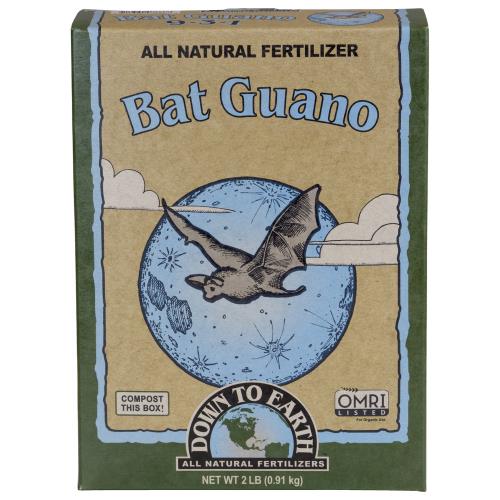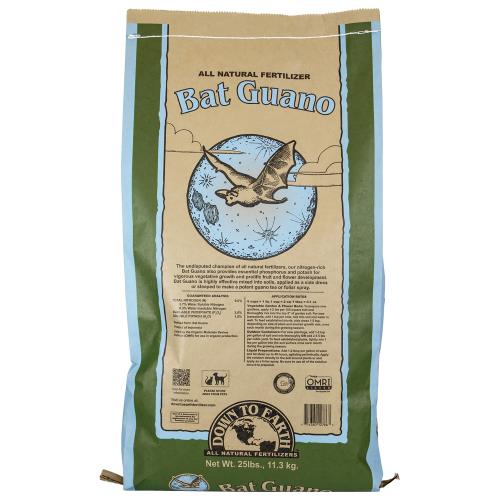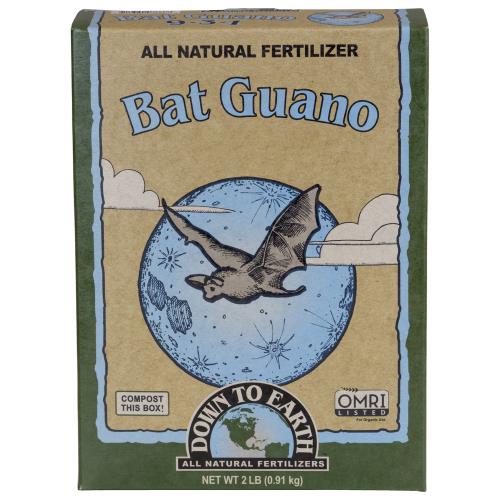Down To Earth
Down to Earth BAT GUANO 7-3-1 OMRI
Down to Earth BAT GUANO 7-3-1 OMRI
20 in stock
Couldn't load pickup availability
Payment options
- Fast Delivery
- Easy Returns
- Secure Checkout
Description
Description
Down to Earth Bat Guano 7-3-1 OMRI is an exceptional organic fertilizer derived from the droppings of fruit bats (Phyllostomidae) that offers a nutrient-rich and natural solution to nourish your plants. This Organic Materials Review Institute (OMRI) listed guano is produced and processed to preserve the valuable nutrients, making it a sustainable choice for eco-conscious gardeners, farmers, and growers. Bat guano is renowned for its high phosphorus content, essential for promoting root development, flowering, and fruiting in plants.
Key Features:
1. High Phosphorus: With a phosphorus content of 7%, this guano is an excellent source of this vital nutrient that is crucial for root growth, flowering, and fruiting.
2. Organic and OMRI Listed: Down to Earth Bat Guano is certified organic and approved for use in organic production by OMRI, ensuring it aligns with organic farming practices.
3. Slow-Release Nutrients: The nutrients in bat guano are released gradually, providing a consistent source of nourishment to your plants while reducing the risk of over-fertilization.
4. Sustainable Nutrient Source: Bat guano is a renewable resource, and its collection does not harm bats or their habitats.
5. Versatile Application: This product can be used for a wide range of plants, making it suitable for both indoor and outdoor gardening.
Benefits:
1. Natural and Organic: This guano offers a natural and organic way to fertilize your plants, minimizing the environmental impact associated with synthetic fertilizers.
2. Enhanced Blooms and Fruits: The high phosphorus content is especially beneficial for flowering plants and fruiting trees, resulting in more significant blooms and yields.
3. Soil Improvement: Bat guano contributes to improved soil structure, increased microbial activity, and better water retention.
4. Eco-Friendly: By using bat guano, you are supporting sustainable agricultural practices that don’t harm the environment.
Applications:
Down to Earth Bat Guano 7-3-1 OMRI is suitable for various applications, including:
1. Flowering Plants: Promote larger and more vibrant blooms on your flowers and ornamental plants.
2. Fruiting Trees: Enhance fruit production and quality in your orchard or garden.
3. Root Crops: Support root development and overall plant growth in root vegetables.
4. Organic Farming: A great choice for organic growers looking for sustainable and OMRI-listed fertilizers.
Usage Tips:
1. Apply bat guano during the planting phase, or as a top dressing during the growing season.
2. For potted plants, sprinkle a small amount of guano on the soil’s surface, and for garden beds, gently mix it into the soil.
3. Follow the recommended application rates and guidelines provided on the product label for optimal results.
4. Water your plants after application to activate the nutrients and encourage absorption.
5. Store the product in a cool, dry place to maintain its quality.
Down to Earth Bat Guano 7-3-1 OMRI is a natural and organic fertilizer that enriches your plants and soil in an eco-friendly manner. Whether you’re a dedicated organic gardener or a conscious grower, this bat guano provides a sustainable and effective means to nurture strong plant growth and support environmentally responsible agriculture.
Share


INFORMATION QUESTIONS
FREQUENTLY ASKED QUESTIONS
What is Hydroponics?
Hydroponics is the science of growing plants without soil. The plants thrive on the nutrient-water solution alone. The growing medium merely acts as a support for the plants and their root systems while the solution passes freely. The growing medium, if any, is totally inert.
What types of plants grow best hydroponically?
Anything can be grown hydroponically, but some plants prove to be more space efficient. Some plants we suggest are tomatoes, sweet peppers, hot chilies, lettuce, spinach, squash, cucumbers, broccoli, beans, snow peas, herbs and flowers of all types.
Can you REALLY get better yields/quicker growth?
Absolutely. The plants, when receiving everything they need, tend to be healthier, faster growing and generally more productive. You can expect 30% faster growth with many crops.
What are the watering cycle timelines hydroponic systems?
Once the reservoir is filled with nutrients, it is time to put your hydro system to work! The ease of hydroponics is automation – automation is achieved by putting the pump on a timer according to your watering needs. The watering cycle depends on growth stage, growing medium and hydroponic system. In an ebb and flow or drip system with rockwool as the medium, seedlings, clones and plants in the early vegetative stage require watering only once a day for 15-30 minutes (twice a day for higher temps). Mature, flowering and fruiting plants require a heavier feed and can be fed once a day for 30 minutes (twice a day for higher temps). Typically soiless mixes and coco fiber can be watered for about 15 minutes twice a day, and can be adjusted for heavier feeding during the flowering and fruiting stage or higher temps. ViaStone, Hydroton, Grow Rocks, and Silicate mediums need to be watered more frequently – a constant drip for drip systems, and about 15-30 minutes every 3 hours for ebb and flow systems and can be adjusted for heavier feeding during the flowering and fruiting stage or higher temps. Aeroponic systems require frequent watering cycles; 30-60 seconds every few minutes or a constant spray.
What do I need to test pH? How do I test pH?
pH has a range from 0 (acidic) – 14 (alkaline), with 7 being neutral. A proper hydroponic pH range is between 5.5 to 6.2 for most hydroponic crops. For specific crop pH, check out our Plant Guide. pH must remain within the proper range for good plant health, disease resistance, and proper nutrient uptake. pH is maintained by adding pH Up and pH Down to the nutrient solution. For more information, see the Testssection of our site.
How will the flavor compare to my outdoor grown, organic produce?
The taste may be even better! This is simply due to the fact that the hydroponically grown plants are getting everything they need, when they need it. Don’t be fooled by “hot house” produce grown commercially. The grower’s primary concern is shipability and storage, not flavor. When you grow your own vegetables at home, you can expect nothing less than excellent results. Plus, hydroponically grown produce has the added benefit of a longer shelf life.

